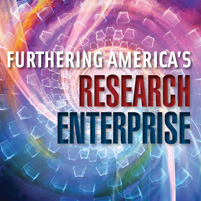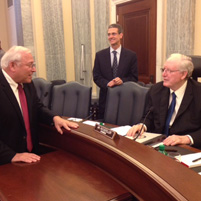Investing in Innovation


Professor Stephen Fienberg (left) and Senator Jay Rockefeller (seated)
Carnegie Mellon University and other leading U.S. research universities are a vital resource of research and innovation that has become essential to everyday life, not only in America but also the world.
Those technologies include medical advances and communications and commerce enabled by Google and the Internet.
"The benefits of the federal investment in scientific research are manifest and have enabled the United States to achieve unprecedented prosperity, security and quality of life," said Professor Stephen Fienberg during a recent Senate hearing.
Fienberg, the Maurice Falk University Professor of Statistics and Social Science, represented Carnegie Mellon University on a panel of science experts for a U.S. Senate Committee on Commerce, Science and Transportation hearing that considered the federal government's role in research and development, and the nation's STEM (science, technology, engineering and math) education and outreach initiatives.
Fienberg, who has appointments in the Dietrich College's Department of Statistics, Heinz College and the Machine Learning Department, served as a member of the Committee on Assessing the Value of Research in Advancing National Goals of the National Research Council (NRC).
The operating arm of the National Academy of Sciences, National Academy of Engineering and the Institute of Medicine, the NRC studies ways to measure the impact of research on society, in particular, how an increased amount of research could be transferred to commercial products and services. The NRC report, "Furthering America's Research Enterprise," was published earlier this year.
"Congress asked the academies to study measures of the impacts of research on society, especially measures that could serve to increase the translation of research into commercial products and services," Fienberg said.
According to Fienberg, greater benefit will come, however, from measures to guide the pillars of the research enterprise — talent, resources and basic research.
"If we cultivate talent, provide adequate and dependable resources, and invest in a diversity of basic research, fresh discoveries will continue to power our economy and to enrich our lives in unpredictable and unimaginable ways," Fienberg said.
Joining Fienberg on the panel of internationally renowned experts were Mariette DiChristina, editor in chief and senior vice president of Scientific American; Vinton G. Cerf, computer scientist, Google's chief Internet Evangelist and one of the fathers of the Internet; and Neal F. Lane, former director of the White House Office of Science and Technology Policy.
"To make sure America continues to lead the world in research, we must provide support for the institutions and agencies at the center of American innovation," said John D. (Jay) Rockefeller IV, chairman of the Senate Committee on Commerce, Science and Transportation.
Rockefeller introduced the America COMPETES Reauthorization Act of 2014 soon after the hearing.
"The America COMPETES Reauthorization Act of 2014 supports a wide-range of critical research, while also advancing STEM education and working to put our best research results into the marketplace," Rockefeller said. "Our bill makes it clear that the U.S. is committed not only to investing in research, but also to getting our students excited about STEM so that America can continue to lead the world in innovation."
Related Links: Dietrich College | Scientific American "Stephen E. Fienberg: 'Innovation Is a Process That Itself Requires Investment'" | National Research Council "Furthering America's Research Enterprise" | Rockefeller Introduces America Competes Reauthorization Act of 2014 | Senate Hearing [video]
